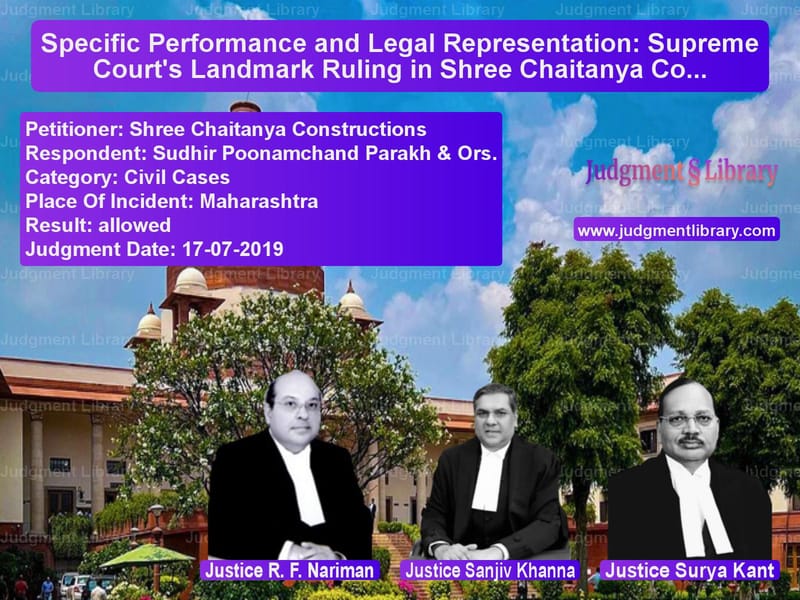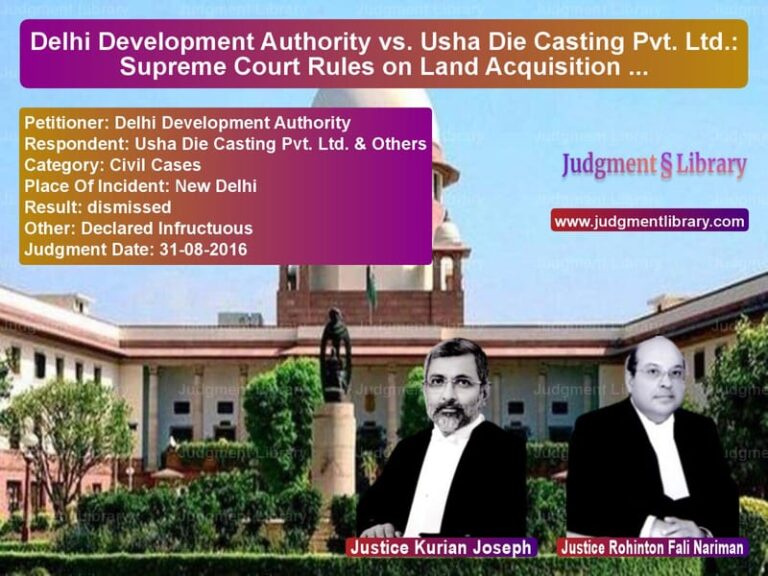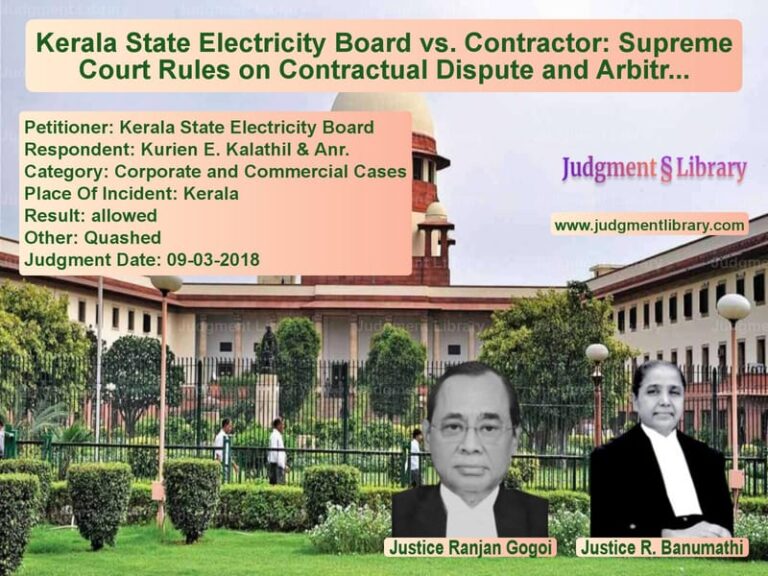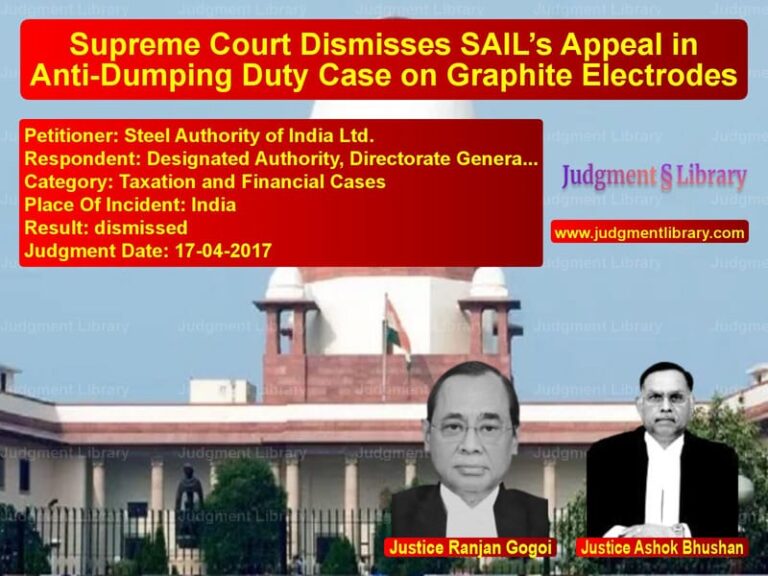Specific Performance and Legal Representation: Supreme Court’s Landmark Ruling in Shree Chaitanya Constructions Case
The Supreme Court of India recently ruled on a crucial case involving specific performance of a contract and the validity of legal representation in court proceedings. The case, Shree Chaitanya Constructions v. Sudhir Poonamchand Parakh & Ors., revolved around a property dispute where a plaintiff sought specific performance of an agreement. The case raised important legal questions about the representation of a party by an advocate without a written Vakalatnama and whether such representation could form a basis for recalling a judgment.
Background of the Case
The dispute began when the plaintiff filed a suit for specific performance on October 15, 2010, against multiple defendants. Only Defendant No.5 (Respondent No.1 in this appeal) contested the suit by filing a written statement on February 4, 2011. However, this defendant neither led evidence nor cross-examined the plaintiff before the trial court.
On November 7, 2012, the trial court rejected the prayer for specific performance and instead directed that Rs. 2,26,40,370 be paid as a refund of part consideration already given. The plaintiff filed an appeal against this decision on April 3, 2013, before the High Court.
High Court Proceedings
During the pendency of the appeal, an inter se dispute arose among the defendants regarding a partition suit (O.S. No. 1298 of 1999). The subject property was listed as Item No.7 in the schedule of that suit. In 2007, the court passed an interim injunction restraining the defendants from creating third-party rights over the property. However, since the partition suit was dismissed for non-prosecution on November 18, 2014, the interim injunction automatically stood vacated.
Meanwhile, a Memorandum of Understanding (MoU) was executed between the plaintiff and the defendants, confirming the sale agreement. Notably, Defendant No.5 (Respondent No.1) admitted the existence of this MoU in his written statement.
The High Court heard the appeal and overturned the trial court’s decision on February 14, 2018, granting specific performance in favor of the plaintiff. During these proceedings, senior advocate P.S. Dani appeared for Respondent No.1 and advanced various legal arguments challenging specific performance.
Review Petition and Controversy Over Legal Representation
After the High Court’s decision, Respondent No.1 filed a review petition, claiming that he had not authorized the counsel who appeared on his behalf in the appeal. He stated that he received a copy of the judgment two days later and was “shocked” to find that he was represented by an advocate without his consent. He further alleged that no Vakalatnama (formal authorization) was executed in favor of Mr. Mandar Soman, the lawyer who briefed Senior Advocate P.S. Dani.
The High Court, considering the lack of a Vakalatnama, allowed the review petition and recalled its earlier judgment on September 27, 2018, thereby restoring the appeal for fresh consideration.
Supreme Court’s Judgment
The Supreme Court, in its judgment authored by Justices Rohinton Fali Nariman, Sanjiv Khanna, and Surya Kant, reversed the High Court’s order and reinstated the original decision granting specific performance. The Court held:
“The fact that Respondent No.1 did not personally authorize the advocate does not by itself vitiate the proceedings, especially when he was duly served with the notice and had chosen not to appear.”
The Court further stated:
“If a litigant fails to appear despite service and a lawyer represents them, the party cannot later claim that they were unrepresented merely due to the absence of a formal Vakalatnama.”
The Supreme Court made the following key observations:
- Respondent No.1 was served with notices multiple times and even through newspaper publication.
- The High Court had recorded extensive arguments made by his counsel, including on maintainability, admissibility of the MoU, and inequity in granting specific performance.
- Respondent No.1 did not claim that his counsel argued against his interest or colluded with the opposing party.
- Even if no formal Vakalatnama was executed, the fact that the advocate appeared and argued effectively negated the need for review.
Key Takeaways from the Judgment
- Service of Notice is Key: Once a litigant is served with notice, their failure to appear does not invalidate subsequent proceedings.
- Role of Vakalatnama: The absence of a formal Vakalatnama does not automatically lead to the setting aside of a judgment, especially when arguments have been made in the party’s defense.
- Principle of Finality: The Court emphasized that a review petition cannot be used as an appeal in disguise, particularly when the party had ample opportunity to participate in the original proceedings.
- Equitable Relief: Specific performance was granted based on admitted agreements, and procedural technicalities could not defeat substantive justice.
Conclusion
The Supreme Court’s ruling in this case establishes a crucial precedent regarding the role of legal representation, Vakalatnama requirements, and the validity of review petitions. The decision reinforces the principle that once a party is served, they cannot later claim non-representation to overturn a judgment. Furthermore, the judgment upholds the sanctity of specific performance in contracts while ensuring procedural integrity in litigation.
Petitioner Name: Shree Chaitanya Constructions.Respondent Name: Sudhir Poonamchand Parakh & Ors..Judgment By: Justice R. F. Nariman, Justice Sanjiv Khanna, Justice Surya Kant.Place Of Incident: Maharashtra.Judgment Date: 17-07-2019.
Don’t miss out on the full details! Download the complete judgment in PDF format below and gain valuable insights instantly!
Download Judgment: Shree Chaitanya Cons vs Sudhir Poonamchand P Supreme Court of India Judgment Dated 17-07-2019.pdf
Direct Downlaod Judgment: Direct downlaod this Judgment
See all petitions in Contract Disputes
See all petitions in Property Disputes
See all petitions in Specific Performance
See all petitions in Judgment by Rohinton Fali Nariman
See all petitions in Judgment by Sanjiv Khanna
See all petitions in Judgment by Surya Kant
See all petitions in allowed
See all petitions in supreme court of India judgments July 2019
See all petitions in 2019 judgments
See all posts in Civil Cases Category
See all allowed petitions in Civil Cases Category
See all Dismissed petitions in Civil Cases Category
See all partially allowed petitions in Civil Cases Category







